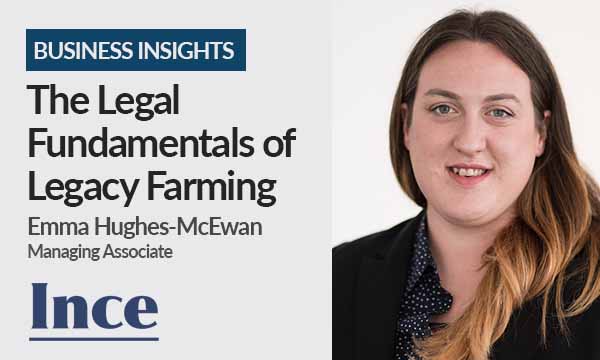 Written By:
Written By:
Emma Hughes-McEwan
Managing Associate
Dispute Resolution, Ince
Lack of succession planning is serious problem in agriculture; it can affect a farmer’s business, family and more broadly, the future viability and success of the farming industry.
In addition, with the growing social and financial pressures for farmers to diversify into alternative farming and renewables, the agricultural sector is feeling the pressure as generations disagree on the future of a farm.
Ince provide a multitude of legal services aimed to help farmers and their successors “break new ground” and look to the future of their farms.
Specifically, Ince’s dispute resolution department in Cardiff has acted for a number of clients in relation to farm land and property and have encountered issues which re-occur frequently. These issues are not exhaustive but could have been avoided or diffused with prior planning.
Do you know your land?
It is fair to say that a farmer knows their land like the back of their hand. However, does this knowledge reflect the title deeds that they hold in their possession, or the title information and plans registered at the Land Registry?
If ownership of a farm has not been transferred or a mortgage registered against the farm or property in the past 40 years, it is likely that the land is not registered with the Land Registry. This can leave farm lands open to potential boundary disputes.
However, it is possible to minimise this issue by way of voluntary first registration of your land. This will assist with cheaper and more efficient transactions in the future and provide evidence of the extent of your land by a title plan, thereby minimising the potential for boundary disputes. Voluntary first registration also has the benefit of a lower registration fee than compulsory first registration.
When reviewing their title plans, a farmer may discover that they have been using land uninterrupted yet without permission which does not fall within their plans. This may result in an adverse possession claim, therefore increasing the land in formal ownership if successful.
Beyond ownership, it is vital to understand the restrictions and designations of your land and whether they may affect your ability to diversify your farm – now or in the future.
Understanding your land now will allow you to make decisions on ownership, potential diversification and plans for the future of your farm.
Your farming business
Like any other business, farming businesses have to consider who is responsible for the running of the farm – both physically and financially. This is particularly important when the farm is owned and run by multiple people and financial or other investments are made by these owners.
Furthermore, the business must consider the succession of shares of the farm following the retirement or death of one of the owners. The need for succession planning is becoming prevalent; as land prices increase owners may be more likely to want to retire and “cash in” their share.
Partnership Agreements are a key method of discussing and formulating these matters before disputes arise. It is also important when considering potential diversification, that you enter into or update Partnership Agreements to reflect the potential future of the farm. Agreements will assist parties to manage any disagreements and provide a guide for progressing towards new ventures.
At family-run farms, the risk of disputes does not decrease. In these circumstances, it is important that all documents reflect everyone’s understanding. For example, in the event that one child invests physically and/or financially in a farm, the child and the parent farmer should look to formalise an agreement, and that agreement should not be contradicted by a Will which includes other children as beneficiaries.
Home truths
Beyond estate planning, family-run farms consist of not only the family land, but also the farm house.
As property becomes increasingly difficult to purchase for first-time buyers, adult children and potentially their partners may move into the family home to help save money. However, these arrangements can lead to questions regarding the responsibilities and rights during and following the cohabitation. Cohabitation agreements set out arrangements between two or more people who have agreed to live together, to reduce possible disputes in the event the cohabitation ends.
In instances where you or children who are successors of farmland or property are looking to get married, it is important to enter a pre-nuptial agreement and/or post-nuptial agreement to provide clarity for the ownership of these assets. These agreements also have particular ramifications for business diversification, as farmers seek to create other income which may increase the value of a farm during a marriage.
Time to diversify?
In times where diversification may provide alternative income or a lifeline to the farming industry, succession planning will ensure farmers can plan to succeed.
Ince in Cardiff is here to assist farmers with their plans.






